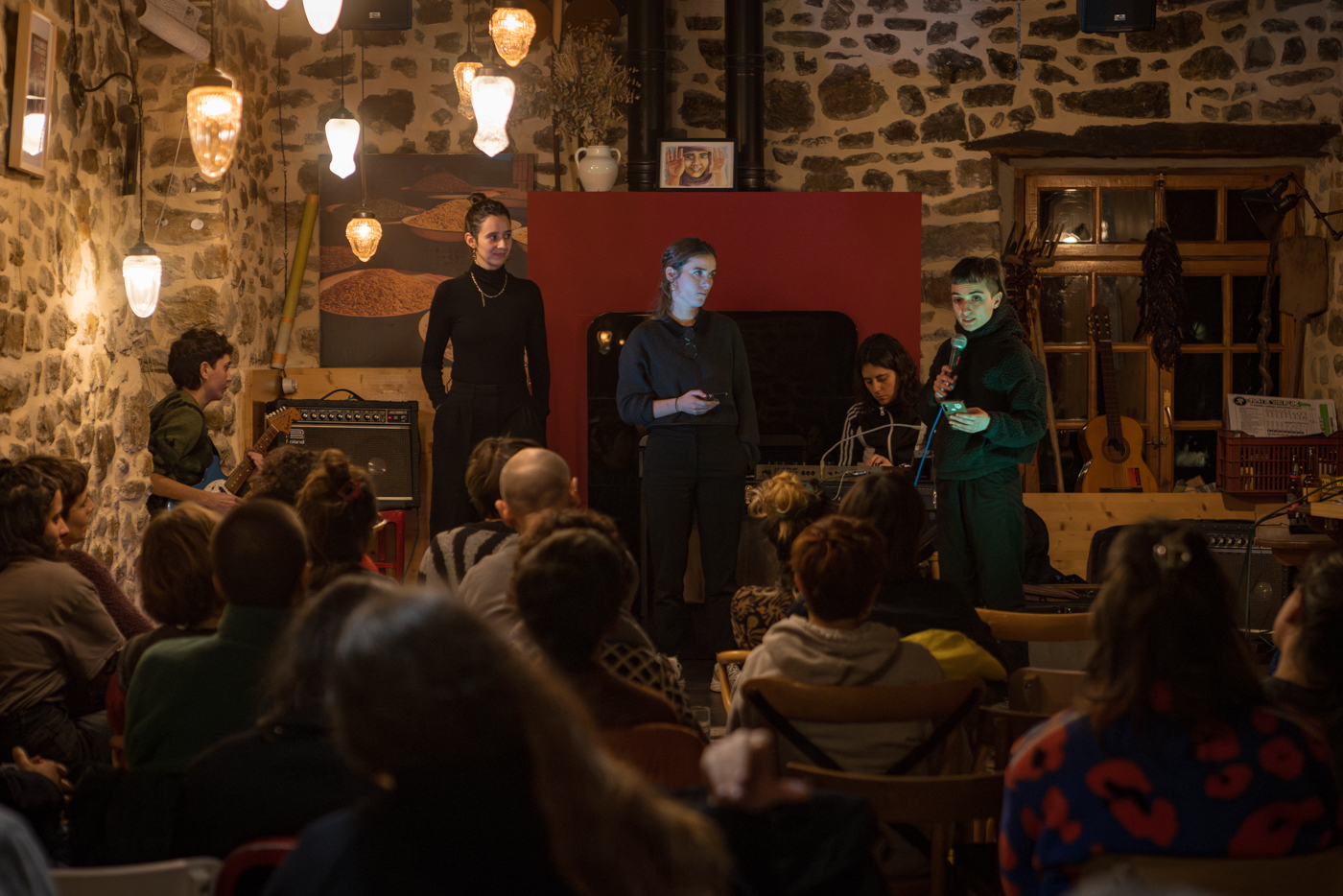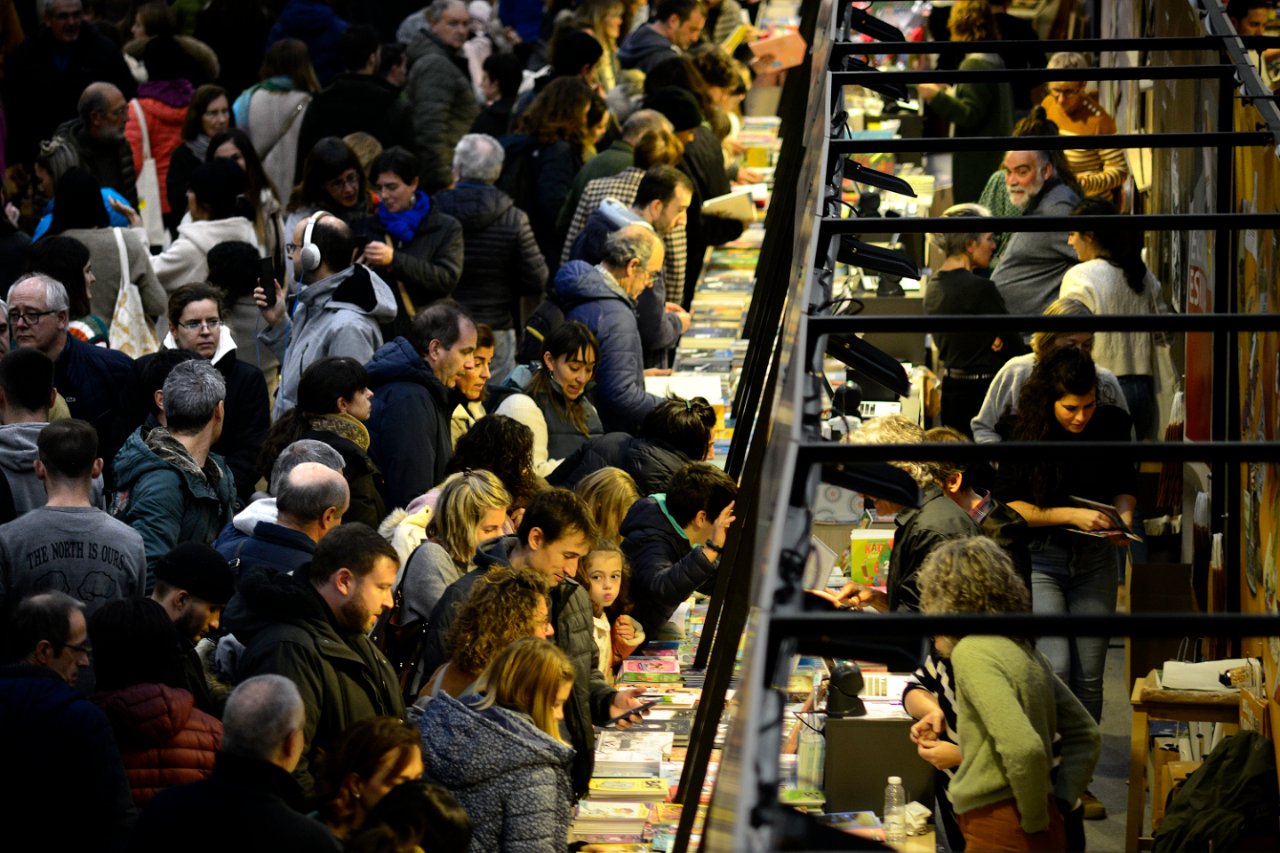"The novel talks more about interdependence than custody."
- Again, 1990. Studied Basque Philology. Bertsolari. Columnist in the press. Haur has written literature and Basa (Elkar) is the first book to name him as a writer. Novels XX. He won the Igartza Award in 2017. The protagonist is Sabina Gojenola, a widow who runs the caserio Altzerreka and expects to find work. It's wild and stubborn. Henry takes care of the custody of his sister-in-law and manages with difficulty with his children.

Does Bertsolarism help to appear as a writer?
I think it has everything. As far as writing itself is concerned, the linguistic training of Bertsolaris is of great help, especially with regard to oral records, since many of the characteristics of the language are used in Bertsolaris. Maybe in the narrative you don't notice that, but in the conversations you do. I have received them from Bertsolarism. Then, both activities are so different! I live Bertsolarism as an activity from inside out, while writing is an exercise from outside for me. The optimal mood I need to be bertsolari and the one I need to write are totally different. I've realized this in times when I've been writing a lot, I struggled to get to the plaza, master temperature changes and registration. We work with a very different body on both tasks.
Is bertsolari a stigma on the road to writing?
There have always been and there will be those who look at us with suspicion for being bertsolari, but when you work with a little spectacularity, especially at the beginning, I see it as an advantage. Then, I don't know the world of writers so much, I don't know what perception they can have of the work of the bertsolaris, and I'd rather not think about it. I try to get away a little bit from that whirlwind.
The actions of Uxue Alberdi against the throat and Eider Rodriguez Emakumeen gorputza have been the ones that have given rise to speaking. They're books about Bertsolaris women and writers. What do these books mean?
They both talk about the added difficulties of being a woman in creating or publishing her own work, and I believe that publishing it at the same time makes them complement each other. This shows, once again, that the mechanisms of domination of women are not isolated practices, that heteropatriarchy is a whole system, that is, that it also runs through our activities from one side to the other. In the case of Bertsolaris women, this collective reflection has been framed within the network we have reinforced in recent years and we have received reactions of all kinds. I don't know what effect the book will have in the medium term, but if it serves to give a little air to a little girl who has just started singing right now or for any man in the world of Bertsolaris to rethink her practices, that's more. For example, I was served when I presented Basa, some aspects that Eider analyzes in his book: authorship, literary posture...
"We strongly associate the role of the caregiver with that of submission, but in the case of Sabina there is a kind of empowerment, of empowerment"
Coming to his book, especially today, it is said that we have to work, from fiction, the historical memory of the armed conflict that has just passed. You have not made that choice.
Who says we necessarily have to talk about politico-armed conflict? I don't know. I have not touched on that in this novel, but I am reminded of the works of writers that may be my fellow generals and they have also worked on other issues, although so far they were not on the front line, also the conflicts of Basque society. I would say it's a matter of distance, of perspective. To me, for example, it would be very difficult to write about an era that I have not lived through, whatever the subject, and in the case of the politico-armed conflict, I believe that there has not yet been enough time to begin to fictionalize the times that we have experienced. It is true that in Basa there are other types of conflicts that have centrality but the story is situated in some specific space-time coordinates and I have tried to take good care of it. I think, even if it's between lines, there are characters that allow the reader to imagine where they can move ideologically.
Why have you chosen to create this rural environment story? Is there anything like the Altzerreka farmhouse today?
Yes, some have told me that Altzerreka has been identified with the villages around it. More than one asked me in astonishment: How have you written that as a young person? What is your connection to this world? The world that appears in the novel I am very sorry, is something that I have known, and my pretension has not been to write about the possible end of that world that is so often mentioned. I wanted to talk about Sabina and I've tried to contextualize the character as best I could to show how the context he's touched influences his personality.
So, this "wild" world isn't over.
As society continues to be savage, there are and there will be people who have the temperament of Sabina. Sabina's savagery appears in the context of the farmhouse, is transmitted through the animals, Sabina manages the psychic and non-psychic instruments that she has in her head and I am sure that this savage that has come to live from Extremadura, a widow like Sabina, who has carried out her life, who has lived through many conflicts that cross the body of Sabina, is living. Of course, it means a different savage, because the context of the street is different.
Euskal Herria: the “old” world of the dwelling and the “new” world of the street. Does this “duality” still exist?
I have the feeling that we've worked a long time with the story of that dichotomy, but I would say that today that distribution is not as rigid as in other times, even though there are still many small ecosystems far apart from each other. I believe that limiting ourselves to duplication has done nothing to our narrative, either in realation or in fiction.
Sabina is a truly savage woman. Where have you fed to give her body?
Since I was little, I've had around me more than one woman of that profile, each with her nuances. I was born in a rural neighborhood, I'm a single daughter, and I've always been in the neighborhood dwellings or my grandmother's. The imaginary of my childhood is linked to the dwelling and I remember most of the experiences around women. For years, I've kept a lot of images and memories, and as I got to adulthood, they began to appear again. Seeing those women fighting with the dogs, skinning the rabbits, with their hands bloody, has been a natural thing for me. Later, after making a deeper reading of those experiences, it seemed to me that there could be something I counted, that there could be enough stuff to create a powerful character that could also be identifiable to others. Perhaps what has not been said so far.
It has brought up, among other things, the current monitoring activity.
Yes, but to me that has not been the focus of the book. The character was the axis and my intention was to put it in the most appropriate context for your personality to get clear.
Did you begin to invent the story after putting the protagonist and the context?
In a way, yes. When I realized that the issue of care, which is heard so much today, was going to have a lot of weight, I worried. It's so complex that I had to treat it very carefully. On the one hand, because I could risk falling into the pamphlet, it often happens that when a concept is used so much, the meaning is blurred. I would say that this novel speaks more of interdependence than of care. And, on the other hand, because I wanted to be honestly placed, because I know more in theory than in the practice of elderly care. “Who am I to give a speech about this,” he told me.
Storytelling is more important to you than content.
Both are important, but I have tried to put aside the speeches, and I have confined myself to reporting facts. I think it is very important to “complicate” the care or conflicts we live every day, that is, to show the different faces of everyday conflict through the characters. In the case of the abdomen, in the role of care and in that of the caregiver. We strongly associate the caregiver's role with submission, but in Sabina's case, there is a kind of empowerment. I wanted to give a new view of that role. It also seems important to me to differentiate the roles of sons and daughters, to show the shocks that can occur in any home in relation to the care of the elderly.
Sabina is free, owns herself, governs the dwarf. The novel is also about directing the house. The novel also contains the subject of matriarchy.
Speaking of matriarchy, Sabina could be a candy to build an idealized female figure. This archetype has always existed within the account of the Basque farmhouse, but today, fortunately, it is in question. Many times we have heard “in our house what my mother was sending” and other things like, “the money my mother was handling in our house.” But the key is that, even when it has, women have maintained their decision-making power in the private sphere. I therefore do not believe that we can talk about a Basque matriarchy when, in all other areas, the division of powers between men and women has not been balanced.
The novel is also an allegation against a successful matriarchy.
Yes, I did not dare to present the book as such but I read it to a critic and I am glad that Basa has made that small contribution.
It's based on fiction and a reflection of the real at the same time.
I have not said anything new in the novel. Every day we see who is in the hands of reproductive work in most homes. The care tasks remain at a high percentage in the hands of women, it is a totally precarious sector... In this sense, the roles of the sons of Sabina are not established by chance.
"I do not think we can talk about a Basque matriarchy when in the other areas the division of powers between men and women has not been balanced"
Sabina takes care of the custody of his brother-in-law Henry. That's why he's still in the farmhouse.
Yes. In the novel we see how at one point he decides to keep the dwelling, with all that this entails and from then on he remains in permanent tension with those who want to get out of the middle: the neighbors, the children... So the moment the novel begins, I would say that its main task, rather than keeping Henry, is to maintain authority. His motor is not so much to take care of his brother-in-law, but to confirm his strength in front of them when he realizes that his children do not see him capable. When we talk about old age, I think there are many processes of disapproval that occur. But in the end, as I said before, one relationship of interdependence is that of Sabina and Henry, similar to a string spin: although one of them adheres to the other, if one falls, the other will fall.
The novel Basa is a reflection of the difficult coexistence. Of great tension. A tragic end. The technique of narration has been fundamental to conseguirlo.El book is made in four narrative planes. How did you fix it?
I know those who stand in front of the computer, write and write. I have written the layer by layer, first I made the whole scheme and then I have been intercaling those four planes: the main thread (the present), the short passages of the past, the thoughts of Sabina and some short passages from chapter to chapter, told from another voice.
In any case, even if I put it in advance, I create the book as I write it, aware that I wanted to write what I have written. I was aware that it was not going to be a novel with many actions, my effort has been to put a strain on the everyday events there, and as I wrote them, I found the right ways to say it.
With the ellipsis technique.
The literature that I like is not the one that has done everything and gives reason n.Como reader I like writers that put me “homework”. When I've been writing, my fear has been too much to say, both discursively and narratively, that it's too obvious. Most of the ellipses I've done consciously, knowing the risks it can pose to the reader.
The nature of sabina produces tension itself.
I was aware that the novel needed an in crescendo, which was clear both in the story and in the environment. The novel begins in a silent white hospital room and ends in the darkness of the stables of the farmhouse, between the noises of the kitchen and the dog’s barking.
Telmo Esnalen Urte berri on, AMONA! It's time for me to think about the film, or Amama, by Asier Altuna.
Many have told me yes. I don't know if Sabina would work on a screen, but as I write, I've thought a lot about the images. I tried to imagine the story and tell it from the scene to the scene.
Is it a novel that asks for a second reading?
More than one has told me, it can be interpreted as a flower or vice versa. I know it's not an easy to swallow novel, the advantage is that it's short, but you have to read it slowly, on that round trip.
Could you see them in the movies?
Oxala! Some have been made difficult by these displacements, so perhaps some could see the story more easily in a movie.
Basa bizkaiera kutsua duen euskara batuaz idatzia da.
Baina ez dago bizkaieraz. Badakit irakurle askok, batik bat gipuzkoarren, “nahi” baten ordez “gura” bat ikusi eta “hara, bizkaieraz dago” esango dutena. Uste dut hor badagoela erresistentzia moduko bat baina zabaldu dezagun ikuspegia apur bat, ezta? Batuaren defendatzailea naiz, noski, baina kontatu nahi nuenari ahalik eta ongien, zehatzen eta indartsuen egokituko zitzaion soineko bat jantzi gura izan diot. Laburrean kontatu behar nuela kontziente izanda, izan hitzak izan irudiak izan espresioak berezko karga zeuzkaten berbak erabili behar nituen, berezko kontestuak eskatzen zuena. Sabinaren ahozko hizkera hori pertsonaia bera ezaugarritzeko modu bat gehiago da. Muga asko topatu dut, hasteko konturatu naizelako zenbat bider pasatzen nintzen erdaratik, euskara etortzeko: izenondoekin, adjektiboekin.
Betiko eztabaida: batua versus euskalkia, edo alderantziz.
Batua eta euskalkiaren arteko eztabaia antzua da, gaindituta eduki behar genuke. Nik, bertsolari bezala, plaza batera joaten naizen bakoitzean ariketa hau egiten dut: Lasartera joaten banaiz, batuaz egingo dut. Nire herrian ari banaiz, Berrizen, ez dut batuaz kantatuko, baina bizkaiera jasoan egiten saiatuko naiz publiko zabal batentzat ari naizelako. Idaztean berdin: edozein euskaldunentzat ari naizenez, batuan egingo dut baina horrek ez du esan nahi mendebaldeko euskalkia alboratuko dudanik. Eguneroko lanabes dudanez gero, zer gutxiago euskarari txinpartak ateratzen saiatzea baino, ezta? Horrek ariketa kontziente bat eskatzen digu idazten edo kantuan gabiltzanoi, baina hartzaileei ere predisposizio bat eskatzen die.
Non dago muga?
Idazten ari nintzen bitartean askotan pentsatzen nuen baten batzuek nire idazkera pedantetzat hartuko ez ote zuten eta beldur nintzen. Ni ez naiz euskaldunagoa euskalkirik ez daukan hiztun bat baino, ezta gutxiago ere. Baina daukadanez gero, zergatik ez neuretik eman? Batuaren bitartez, betiere. Uste dut euskaraz ari garen komunikatzaile guztiok egin behar genukeela ariketa hau: non nago eta norentzat ari naiz. Ez zait buruan sartzen, adibidez, euskal hedabide nazionaletan jatortasunaren edo kolokialtasunaren izenean, euskalki itxian berba egitea. Egitekotan, egin dezagun jasoan edota gure euskalkiaren kolorearekin, baina batuan. Erabilpen egokiaren muga komunikazioaren arrakastan dago.
Joan Tartas (Sohüta, 1610 - date of unknown death) is not one of the most famous writers in the history of our letters and yet we discover good things in this “mendre piece” whose title, let us admit it from the beginning, is probably not the most commercial of the titles... [+]

















ilbeltza-(1).jpg)




